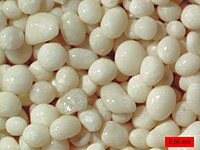oolith
Appearance
See also: Oolith
English
[edit]Etymology
[edit]A piece of oolite, occasionally known as oolith (sense 2), from Braunschweig, Lower Saxony, Germany. Oolite is a type of rock composed of ooliths (sense 1) or ooids.
Borrowed from Late Latin oolithus; the Latin word was coined by the German doctor and mineralogist Franz Ernst Brückmann (1697–1753) as a translation of German Rogenstein (“oolite”) (Rogen (“fish roe”) + Stein (“stone”)).[1] Oolithus is derived from Ancient Greek ᾠόν (ōión, “egg; seed”) (possibly ultimately from Proto-Indo-European *h₂ew- (“to clothe oneself, dress; to be dressed”), in the sense of a bird being clothed in feathers) + λῐ́θος (lĭ́thos, “a stone; stone as a substance”) (see further at that entry),[2] analysable as oo- + -lith.
Pronunciation
[edit]- (Received Pronunciation) IPA(key): /ˈəʊəlɪθ/
Audio (UK): (file) - (General American) IPA(key): /ˈoʊəˌlɪθ/
- Hyphenation: oo‧lith
Noun
[edit]oolith (plural ooliths)
- (geology) A spherical granule of which oolite is composed, formed by concentric accretion of thin layers of a mineral (usually calcium carbonate (limestone) but also others such as dolomite and silica) around a core; an ooid.
- Synonym: (rare) oolite
- (rare) Oolite.
Related terms
[edit]- oolite
- oolithic
- oolitic
- oolitiferous (obsolete)
Translations
[edit]spherical granule of which oolite is composed — see also ooid
oolite — see oolite
References
[edit]- ^ Francisci Ernesti Brückmanni [i.e., Franz Ernst Brückmann] (1721) Specimen Physicum Exhibens Historiam Naturalem Oolithi seu Ovariorum Piscium & Concharum in Saxa Mutatorum, Helmstedt, Lower Saxony: […] Salomonis Schnorrii [Salomon Schnorr], →OCLC.
- ^ “oolith, n.”, in OED Online
 , Oxford: Oxford University Press, December 2020; “oolith, n.”, in Lexico, Dictionary.com; Oxford University Press, 2019–2022.
, Oxford: Oxford University Press, December 2020; “oolith, n.”, in Lexico, Dictionary.com; Oxford University Press, 2019–2022.
Further reading
[edit] ooid on Wikipedia.Wikipedia
ooid on Wikipedia.Wikipedia - Robert L. Bates, Julia A. Jackson (1980) M. Gary, R. McAfee, Jr., and C.L. Wolf, editors, Glossary of Geology, 2nd edition, Falls Church, Va.: American Geological Institute, →ISBN.
Anagrams
[edit]Categories:
- English terms derived from Proto-Indo-European
- English terms derived from the Proto-Indo-European word *h₂éwis
- English terms derived from a Pre-Greek substrate
- English terms borrowed from Late Latin
- English terms derived from Late Latin
- English terms derived from Ancient Greek
- English terms prefixed with oo-
- English terms suffixed with -lith
- English 3-syllable words
- English terms with IPA pronunciation
- English terms with audio pronunciation
- English lemmas
- English nouns
- English countable nouns
- en:Geology
- English terms with rare senses


